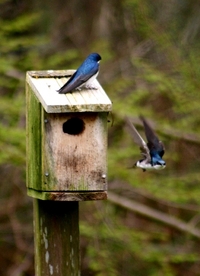| Description | Participants | Summaries | Products | Feature |
|---|
NIMBioS Working Group: Function and Evolution
Searching for Solutions to Evolutionary Puzzles
May 27, 2009
 |
| Do birds compete or cooperate in order to survive? |
Birds are commonly thought of as being the paragon of monogamous fidelity, staying true to their mate for life. Yet, in most bird species, some nests contain offspring of individuals other than the ones tending the nest.
Why would a bird invest in another bird's offspring when genetically such parenting would seem to provide no evolutionary advantage? Many scientists are trying to understand how evolution leads to this phenomenon called "extra-pair parentage."
Erol Akçay, a postdoctoral fellow at Stanford University, is one such scientist who has examined the function of extra-pair parentage. His research has drawn some surprising conclusions, including the idea that extra-pair parentage might result from reproductive "agreements" and transactions between breeding individuals, instead of being the result of males and females "cheating" on each other.
Akçay is part of a group of leading theoretical biologists, ecologists, and mathematicians who gathered at the National Institute for Mathematical and Biological Synthesis (NIMBioS) on the University of Tennessee campus in Knoxville, June 10-12, to develop a new unified framework for evolutionary biology — one that accounts for phenomena like the cooperative behavior exemplified by extra-pair parentage.
The group's goal is to integrate the dynamics of how biological systems function and how these functional dynamics evolve. Functional dynamics refers to the processes that make an organism work, such as the physiological processes of the body, the hormones and cells, and the behavior of individuals. Evolution looks at how organisms change over time. "These two approaches actually complement each other and need to be looked at together," Akçay said.
Using bird behavior as an example of functional dynamics, Akçay said, male and female birds care for their offspring, defend against predators, and bring food to the nest. "But should what the birds are doing be viewed as cooperation or competition?" he asks. "In other words, to assure the survival of their offspring, are the birds working together or separately as individuals?"
From an evolutionary perspective, if the birds are working as a team, Akçay continues, how does their teamwork evolve over time? If they're working as individuals against each other, how does each bird play against the other to make the other do more work?
Akçay's research has been conducted under the guidance of Stanford University professor Joan Roughgarden, who, along with Akçay, is co-organizing the Function and Evolution Working Group at NIMBioS. One of the world's most influential theoretical ecologists, Roughgarden is the author of two books that challenge the Darwinian theory of sexual selection, which says that competition for mates and choice for genetic benefits drive the evolution of certain traits. Roughgarden's new "social selection" theory argues, however, that cooperative processes of breeding, rather than competition and conflict, drive the evolution of reproductive behavior. Akçay and Roughgarden have developed mathematical models that use cooperative game theory to test their hypotheses.
The NIMBioS working group, "Integrating Functional and Evolutionary Dynamics at Multiple Scales," aims to introduce new mathematical methods to biology. "The hope is that, by doing this work, we will give applied researchers an easier way to utilize evolutionary theory in their work, and ultimately, it will give us a better understanding of how living things evolve," Akçay said.
NIMBioS Working Groups are comprised of 10-15 invited participants and focus on specific questions related to mathematical biology. Each group typically meets two to three times over the course of two years at the Institute.
The National Institute for Mathematical and Biological Synthesis (NIMBioS) brings together researchers from around the world to collaborate across disciplinary boundaries to investigate solutions to basic and applied problems in the life sciences. NIMBioS is funded by the National Science Foundation in collaboration with the U.S. Department of Homeland Security and the U.S. Department of Agriculture, with additional support from The University of Tennessee, Knoxville.
For more information, contact Catherine Crawley at 865-974-9350 or ccrawley@nimbios.org
NIMBioS
1122 Volunteer Blvd., Suite 106
University of Tennessee
Knoxville,
TN 37996-3410
PH: (865) 974-9334
FAX: (865) 974-9461
Contact NIMBioS


